#taoist ritual
Explore tagged Tumblr posts
Photo
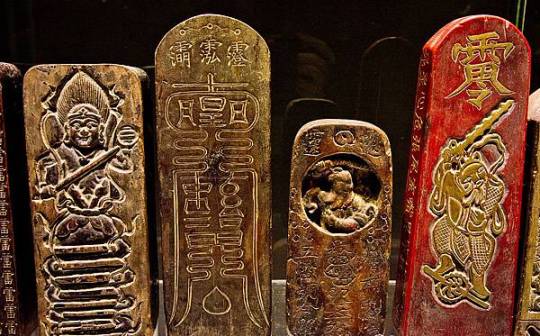
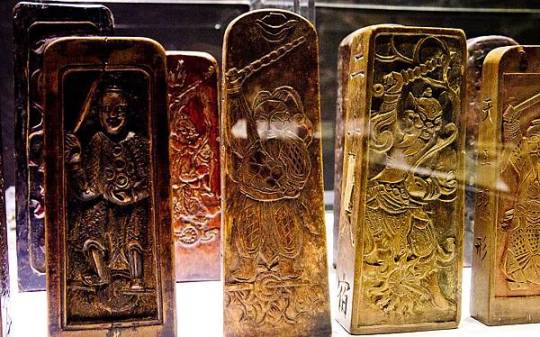
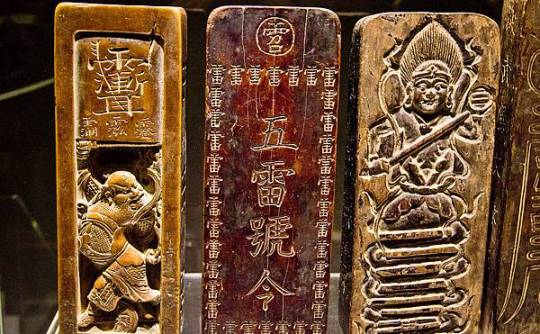
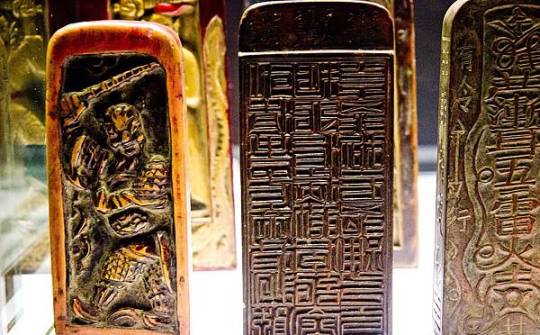
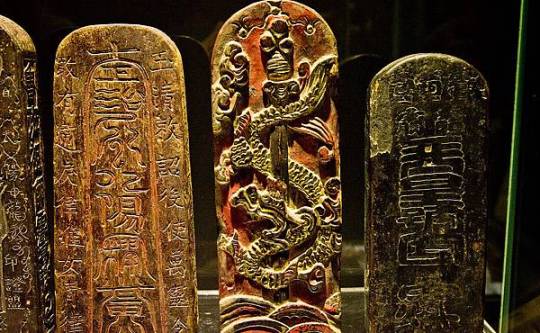
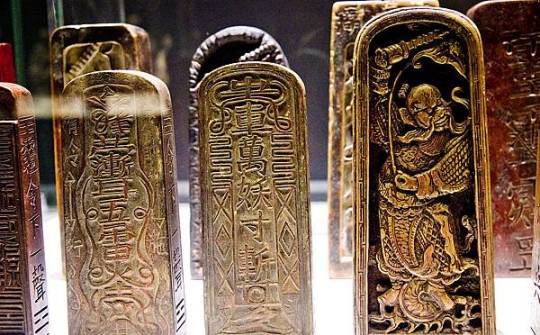
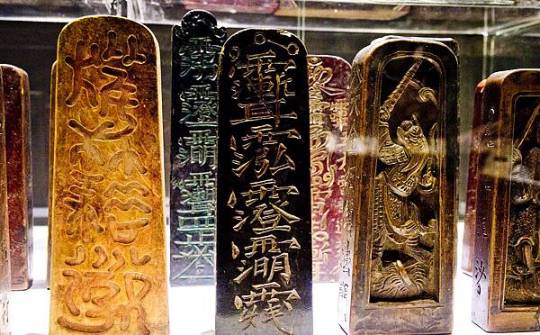
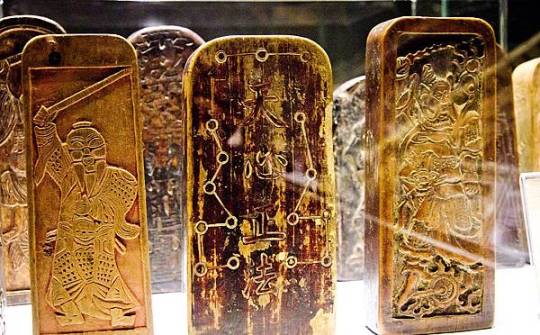
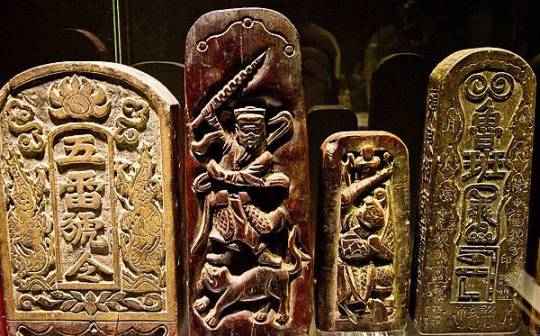
Ming and Qing Taoist tokens (Ling Pai 令牌 aka Lei Ling 雷令or Wu Lei Hao Ling 五雷號令) used in the Thunder Rites (Lei Fa 雷法). Mostly from Lushan Taoist school (閭山派), Fujian.
The tokens are made of wood, often peach wood or jujube, however, jade, ivory, bamboo root, etc. are allowed. The rounded top represents Heavens and the rectangular base – Earth.
The Ling Pai are engraved with signs corresponding to those divinities or forces with which the practitioner interacts during the Rites. The patterns and shapes may vary depending on the Taoist school and lineage, but the overall structure remains recognizable.
Photo: © Lin Mengyi, Xuanwu Daomen Taoist Research Center (林孟毅 玄武道門 道教研究中心), Taiwan.
#qing dynasty#qing#ming dynasty#ming#taoism#taoist#taoist immortal#yuan dynasty#taoist sorcery#taoist magic#chinese mythology#daoism#daoist#chinese myth#chinese culture#ancient china#taoist spell#fu talisman#taoist talisman#taoist ritual#leifa#taoist seals#thunder rites#雷法#xuanwu#真武#zhenwu#玄武#玄天上帝#xuantian shangdi
244 notes
·
View notes
Text

ive been thinking about the red string superstition recently and also sol bufo always and it makes me sick how uncannily caldwell tanner has made sol to perfectly target me personally


(+ cropped versions !)
#naddpod#ba2mia#ba2umia#solum bufo#swag daniels#calliope petrichor#calder kilde#alexandrite#posts by me dot com#okay..... SECRET TAGS RAMBLE!#so basically this superstition is like ... i think a chinese/buddhist/taoist superstition?#ive taken some creative liberties with it... but its mostly accurate to how its been told to me?#but of course theres lots of variations! some more abt bad luck; some say to tie it on the doorknob#etc etc ... lots a variations#i was also rlly interested in the .... weird illogic? of the thing?#like the red attracts and repels spirits at the same time#so thats something i was thinking about with too. red is assocuated with both swag and alexandrite. which to me was kinda reflecting like#i think what murph said . swags place in the wild is in a way. an extension of what he learned from the network#mothership s inextractivle from sol and swags lives. they will always be held doen by it. thats the spirit that will follow them forever#that they choose to hold on too! as much pain as it brought ... some of the experience was worth it#and anyway. theres somethingwrong w me that the minute someone brought up this superstition my brain went#'ohhh just like sol!' < needs to touch grass moment#but i CANT BELIEVE. CALDWELL DID THE RED STRING. AND ITS LITERALLY A MOURNING RITUAL#caldwell keeps accodentally makig that frog ASIAN. to MEEEE!!!!!!#but. anyway. idk. ive always hced sol kept the piece of yarn and it makes me kinda .... what if y let the malicious spirits follow you.#and haunt you. what if its the closest you can get to keeping the person still around#and sol and swag obviously have so much about homes .... so!#(ok. weve reached the pt where maybe nobodys reading? so confession is this is sort of a well. ive just been doodling this comic everyday#after a wake. and it was sort of inspired after realising i was even a bit sad about it maybe. so. idk its about sol but also?#i guess the projection doesnt end at him being asian. hehe. is what i mean. LOL. okay secret tags over . buried lore. dont look here folks)
234 notes
·
View notes
Text
love thinking kipperlilly spends her afterlife looking for lucy in a familiar forest
#not art#fhjy#fhjy spoilers#like. does she have a mean of knowing lucy and yolanda got sent to cassandra's domain to hang out for a bit#kipperlilly's isolation means so much to me. she is punished for everything she's done she just doesn't pick up on it#until the moment she dies! one more funky thing that mirrors riz in which he's actively tried to cultivate a community and denied it#until the bad kids. while kipperlilly does not want or care about a community she just wants someone who validates her#but she does Need a community so she latches onto the person she lets closer to her to fulfill her emotional needs#she took the ritual willingly so this might genuinely be her first death. probably terrifying#probably not even enough bandwidth to feel mortified. maybe immediately seeking something comforting out of instinct alone#lmao honestly thinking too much abt fantasy high afterlifes gives me a headache And a visceral fear#Im not religious but I grew up in a culture with a dominantly buddhist/taoist cosmology its Scary that u just go to A Place after u die!!#and then ur still urself!!! thats scary to me what do u mean u stay like that forever. thats fucked#but yeah I think this influences how I see kipperlilly turn out a little bit. in a sense I think of her as being a ghost now#yknow. trying to solve something from life so she can move on and. stop living this life etc#man the reveal that lucy took being killed pretty seriously and is like yeah the others are decent and even sweet#and probably was just trying to hold her party together and do what she thinks is moral by hearing kipperlilly out#lol lmao etc. gods I gotta wonder how kipperlilly's mindset handled jawbones' help#it really is damn tragic tho. I stand by what I said folks like this will complain and be nasty to be around#but they dont have enough desire to inconvenience themselves to off the bat do something abt what they find unfair or whatever#its when theyre handed the seemingly very easy means to be right that they'll start being dangerous#its horribly tragic that the supposed metaplayer and the self-perceived mastermind turned out to ultimately be just an useful idiot#yknow what. I think personally in my heart kipperlilly moves on from her afterlife the moment she says sorry#doesnt even have to be to lucy but that's probably gonna be who received it#ah.... teenage rebellion. teenage gamejacking
109 notes
·
View notes
Text
Taoist Elements In Sword Forms: A Couple Of Examples
My friend asked to give an example of Taoist element in the form. Well… For instance, the fragment involving a series of horizontal chou (抽) (or xi, 洗 as variant) with steps to both sides and dian (點) at the end (I’m using the names from Essentials Of the Wudang Sword Art (武當劍法大要)by Huang Yuanxiu, I was taught according to the manual of Li Jinglin). Continue reading Untitled

View On WordPress
#Chinese history#Chinese martial arts#Chinese sword#Chinese swordsmanship#jian#sword#tai chi#tai chi jian#taiji#Taoism#Taoist magic#Taoist rituals#Wudang sword
4 notes
·
View notes
Text

Ritual Taoist mask
79 notes
·
View notes
Note
please bless us with more snakecumwar content i am intrigued and obsessed 🙏
Oh course my love
One of my favorite things about Zhuzhi Lang is that he’s literally half heavenly demon, like, if Binghe didn’t have a protagonist halo and the occasional evil sword, zzl could probably match him in strength.
Liu Qingge is the god of war, the human parallel to the peerless might of a heavenly demon. It’s completely reasonable to assume that all things being equal, they could be a completely equal match in a fight. And yet? Their strength is subservient to Shen Yuan. They both have a “repayment of kindness” chivalry-esque mindset that makes them completely devoted to a much physically weaker man. They remind me of the Strength card from the major arcana:

Symbolically, the woman in white gives the lion purpose- not denying the strength of the lion, but not cowering from a beast unfamiliar to the society she comes from. Strength bears a strong connection to Taoist philosophy as well, a balance of dual energy; civilization and beasts, strength and vulnerability, courage and fear, masculine and feminine, heaven and earth, higher purpose and base desires.
Liu Qingge doesn’t fit well with human cultivation society, feeling more at home away from people and in nature- in many ways he is the same as Zhuzhi Lang, a beast not given kind refuge. Shen Yuan sees both of them unflinching, and places gentle hands in thier care, trusting them not to bite as they would to so many others.
Liu Qingge connects with Zhuzhi Lang, not only in being his equal in strength, but also in the understanding that they don’t fit in, despite being the paragon of both their societies.
Zhuzhi Lang’s rebirth imagery as a snake (skin shedding, form changing) oddly give his some Jesus flavor. (Snake Jesus? Snesus?) Shen Yuan literally partakes of his blood, and his chronic illness can be miraculously healed by Zhuzhi Lang. It gives sex between them semi-religious undertones, as if it’s a ritual of rebirth, of sin transferral, the slaughter of the sacrificial lamb.
BUT AT THE SAME TIME, SHEN QINGQIU LITERALLY UNDERWENT AN ACTUAL REBIRTH. He is a whole ass different person!!! And Liu Qingge knew him before!!!!! But now the man Liu Qingge thought he knew is beautiful and strange- was this always a part of him? Was he simply not worthy of such kindness before? Is it a ruse? If it is, he doesn’t want it to end, doesn’t think he could live without the sun shining down on him. In hostile soil, Shen Yuan is what he turns to all hours of the day, seeking seeking seeking like a tap root.
(I know this is like, very not a Chinese cultural lense I’m looking at this through, but you can’t deny that Catholics kinda went off with the themes of death and rebirth and theophaegy!!!!! LOOK ME IN MY BIG WET EYES ABD TELL ME A SNAKE BASED ‘HEAVENLY DEMON’ WASNT BEGGING FOR AN ANALYSIS WITH CHRISTIAN THEMES!!!!!!!!!!!!)
#svsss#scum villian self saving system#shen yuan#shen qingqiu#liu qingge#zhuzhi lang#liushen#zhuqing#snakecumwar
42 notes
·
View notes
Text
Nine Sols coming to PS5, Xbox Series, PS4, Xbox One, and Switch on November 26 - Gematsu
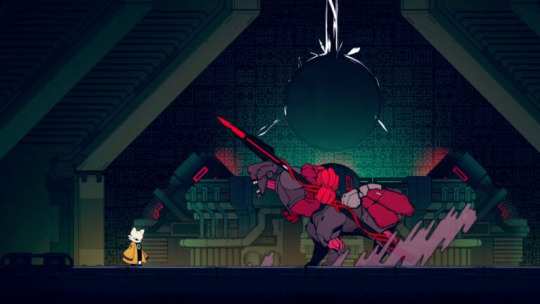
Red Candle Games will release side-scrolling action platformer Nine Sols for PlayStation 5, Xbox Series, PlayStation 4, Xbox One, and Switch on November 26, the developer announced. It will also be available via Game Pass.
Nine Sols first launched for PC via Steam on May 29.
Here is an overview of the game, via its Steam page:
About
From the creators of award-winning psychological horror games Detention and Devotion, comes Red Candle Games’ latest title Nine Sols. The studio aims to deliver a stylized action platformer that’s cohesive and complimentary with its lore-rich narrative. It’s an ongoing, most ambitious project from this indie studio up to date.
Story
New Kunlun, the Solarian’s last sanctuary, has remained quiet for centuries. Inside this vast realm, the ancient gods left mortals with a promised land that is forever protected by the sacred rituals, yet the truth of this world remains unknown to most. Everything changes when Yi, a long forgotten hero from the past, is awoken by a human child. Follow Yi on his vengeful quest against the 9 Sols, formidable rulers of this forsaken realm, and obliterate any obstacles blocking your way in Sekiro-lite style combat. Explore in unique “Taopunk” setting that blends cyberpunk elements with Taoism and far eastern mythology. Unravel the mysteries of an ancient alien race and learn about the fate of mankind.
Key Features
2D Sekiro-lite Combat – Slash, deflect, and charge into enemies and blow them up with the Taoist talisman! Each fight combines fast, brutal action sequences with classic platforming mechanics.
Intriguing Boss Fights – Ready yourself to fight the vicious ancient guardians and gruesome creatures. Be patient and utilize every move in your arsenal, mix up with Yi’s godly bow to defeat these larger than life figures.
Taopunk Setting – When cyberpunk clashes with Taoism, melding sci-fi elements with eastern mythology / fantasy, the experimental genre of Taopunk was born.
Hand-drawn Environments / Animations and Manga – Nine Sols is filled with meticulous hand-crafted, anime-style landscapes, sprite based hand-drawn animations, blending with Japanese manga inspired cutscenes.
Exploration – Traverse in the interconnected regions of New Kunlun. Discover secrets, piece together the story behind Yi’s revenge.
Aids from Inhabitants – Meet interesting NPCs of this world and interact with them to receive upgrades, gain new abilities, and discover useful technology.
Watch a new trailer below.
Consoles Announce Trailer
youtube
114 notes
·
View notes
Text
[Hanfu · 漢服]Chinese immortal Hanfu <西王母/Queen Mother of the West> Based On Yuan Dynasty Taoist Temple Mural<永乐宫/Yongle Palace>
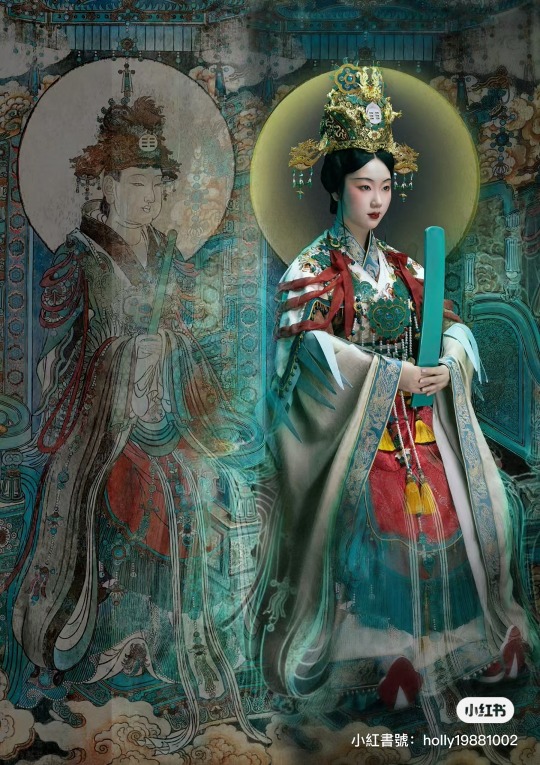
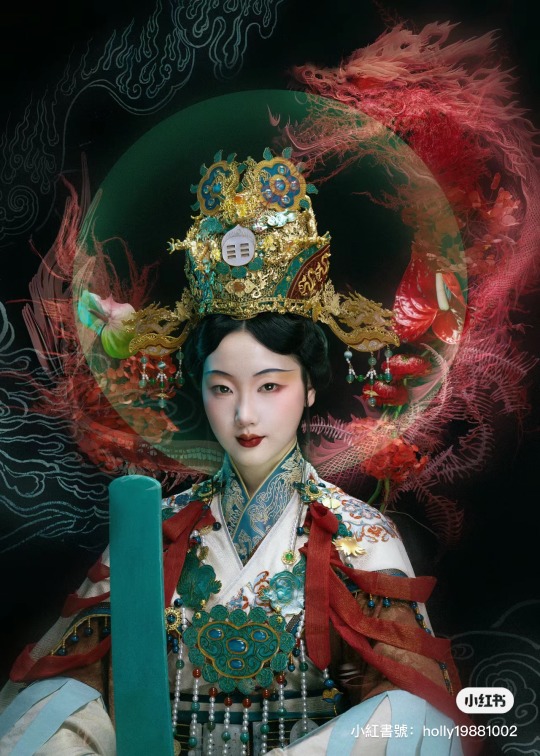
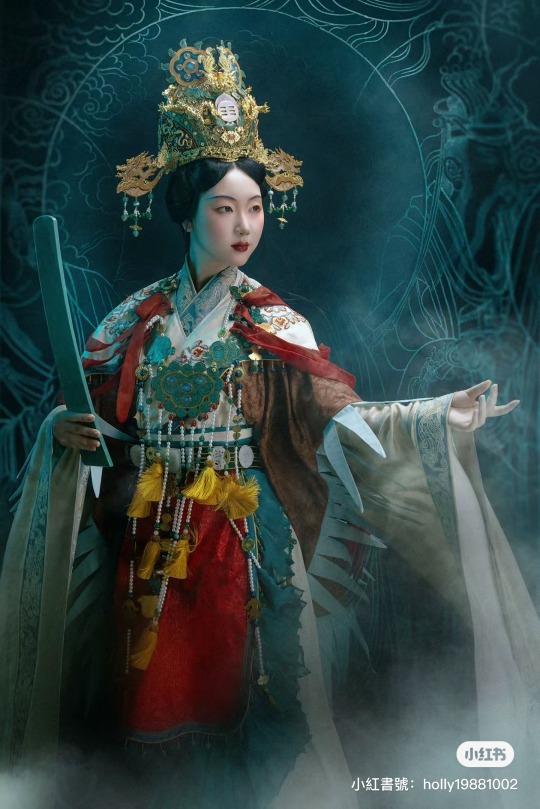
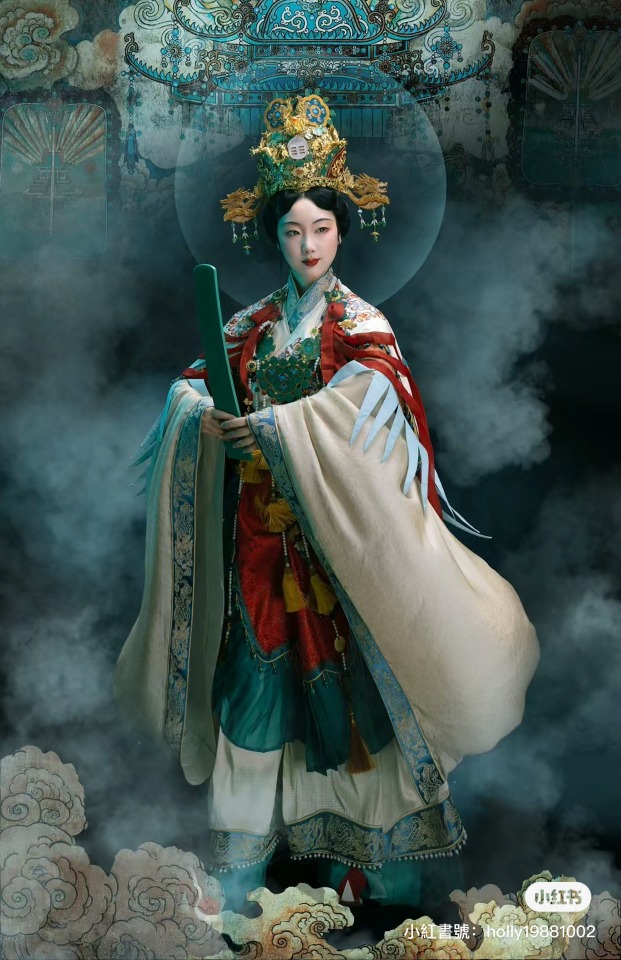
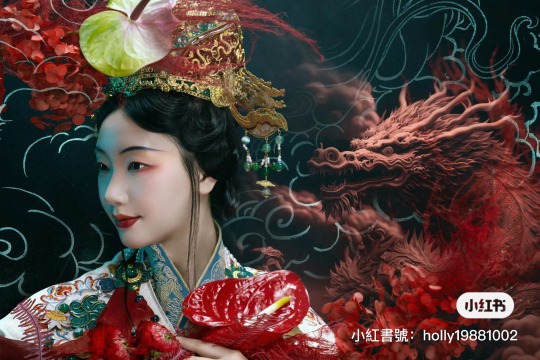
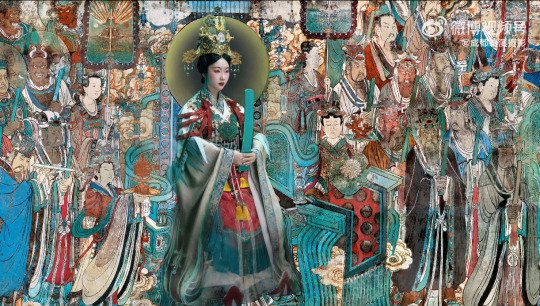
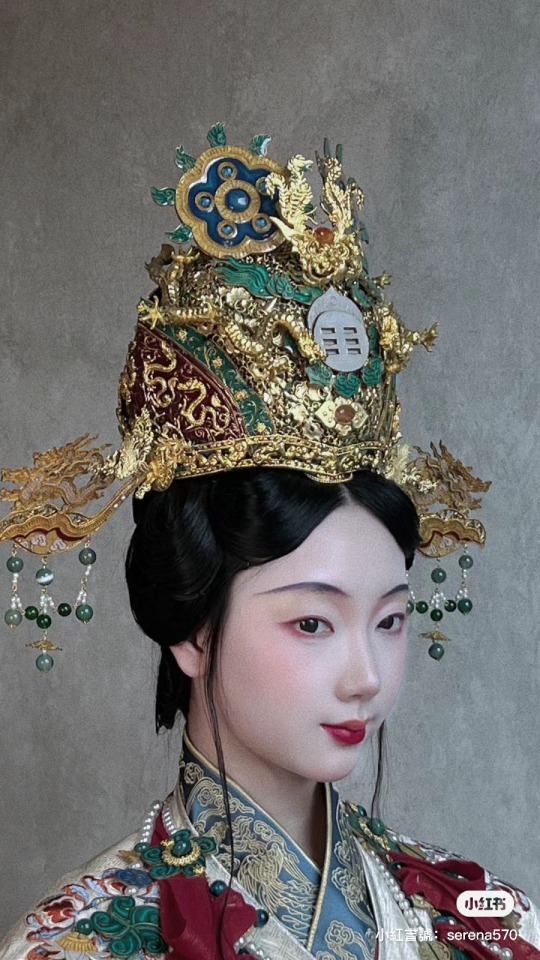
【Historical Artifacts Reference 】:
▶ China Yuan Dynasty Taoist Temple 永乐宫/Yongle Palace Mural
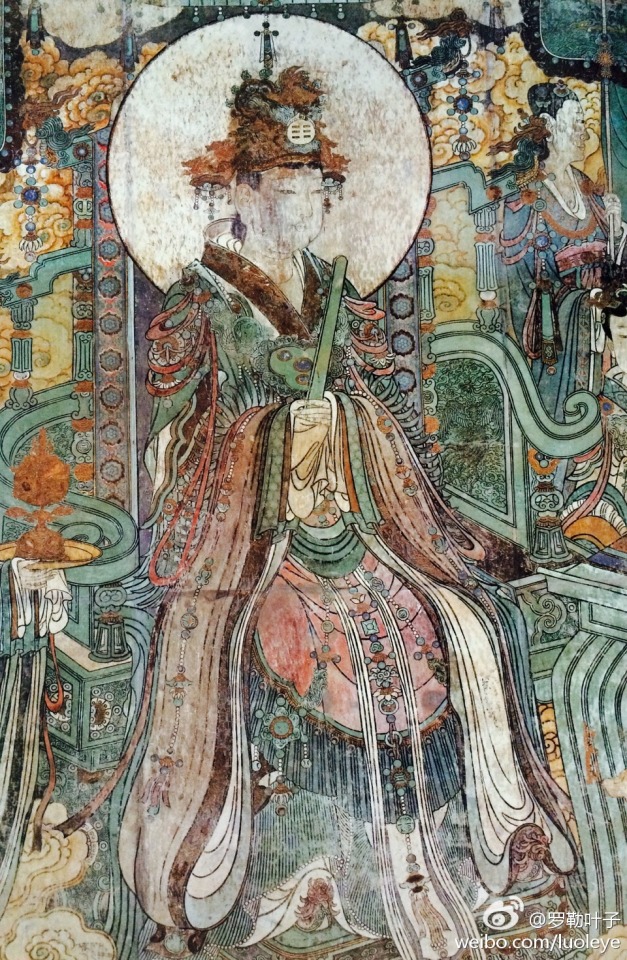
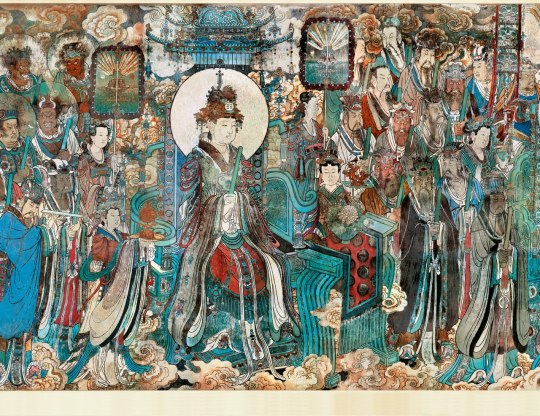
<西王母/Queen Mother of the West>
The Queen Mother of the West, known by various local names, is a mother goddess in Chinese religion and mythology, also worshipped in neighbouring Asian countries, and attested from ancient times.
The first mentions of the Queen Mother date back to the oracle bone inscriptions of the Shang dynasty (1766 – 1122 BCE). One inscription reads:
Crack-making on day IX (9th day), we divined. If we make offering to the eastern mother and the western mother, there will be approval.
Western Mother refers to an archaic divinity residing in the west. The exact nature of the Mother divinities in the Shang dynasty is unclear, but they were seen as powerful forces deserving of ritual by the people of the Shang dynasty. Originally, from the earliest known depictions of her in accounts like the Classic of Mountains and Seas during the Zhou dynasty, she was a ferocious goddess of death with the teeth of a tiger, who rules over wild beasts and sends down heavenly punishments such as pestilences. She was also mentioned as an authority ruling over other divinities such as Jiutian Xuannü, a goddess of war and sex. Other stories hold that she is a mountain goddess or a divine tigress. She is also popularly thought to have blessed the Eight Immortals with their supernatural abilities.
After her integration into the Taoist pantheon, she gradually took on associations with other aspects, such as immortality, as well.
The Queen Mother of the West is most often depicted holding court within her palace on the mythological Mount Kunlun, usually supposed to be in western China (a modern Mount Kunlun is named after this). Her palace is believed to be a perfect and complete paradise, where it was used as a meeting place for the deities and a cosmic pillar where communications between deities and humans were possible.At her palace she was surrounded by a female retinue of prominent goddesses and spiritual attendants. One of her symbols is the Big Dipper.
Although not definite there are many beliefs that her garden had a special orchard of longevity peaches which would ripen once every three thousand years,others believe though that her court on Mount Kunlun was nearby to the orchard of the Peaches of Immortality. No matter where the peaches were located, the Queen Mother of the West is widely known for serving peaches to her guests, which would then make them immortal. She normally wears a distinctive headdress with the Peaches of Immortality suspended from it.
Flourishing parasols, we reach the chronograms' extremity; Riding on the mist, I wander to Lofty Whirlwind Peak. The Lady of the Supreme Primordial descends through jade interior doors; The Queen Mother opens her Blue-gem Palace. Celestial people—What a Crowd! A lofty meeting inside the Cyan Audience Hall. Arrayed Attendants perform Cloud Songs; Realized intonations fill the Grand Empty Space. Every thousand years, her purple crabapple ripens; Every four kalpas, her numinous melon produces abundantly. This music differs from that at the feast in the wilderness— So convivial, and certainly infinite.— Wu Yun (Complete Tang Poems 1967, line 4942)
One of the earliest written references to the Queen Mother comes from the writings of the Taoist writer Zhuangzi (c. 4th century BCE):
The Queen Mother of the West obtained it [the Dao]... ...and took up her seat at Shao kuang. No one knows her beginning; no one knows her end.
Zhuangzi describes the Queen Mother as one of the highest of the deities, meaning she had gained immortality and celestial powers. Zhuangzi also states that Xiwangmu is seated upon a spiritual western mountain range, suggesting she is connected to not only the heavens, but also to the west.
Legendary encounters
In Tu Kuang-ting's text, he includes narrative accounts of the Queen Mother's encounters with legendary Chinese heroes. One such account narrates an encounter between the Queen Mother and Laozi (Lord Lao):
"In the 25th year of King Chao of the Chou dynasty (1028 BCE) …" "…Lord Lao and the realized person Yin Hsi went traveling…" "…on their behalf, the Queen Mother of the West explicated the Scripture of Constant Purity and Quiet."
In this account, the Queen Mother plays the role of Laozi's superior and is credited with the ultimate authorship of the Dao De Jing. This dichotomy of the Queen Mother as the superior is a characteristic of Shangqing Taoism, a goddess worshiping sect of Taoism of which Tu Kuang-ting was a master. There is also an account of a meeting between the Queen Mother and Laozi in Tang poetry.[18] This account however, being of traditional Taoist thought, has the Queen Mother taking an inferior role to Laozi, calling him "Primordial Lord" (the title of his highest manifestation) and pays homage to the sage.
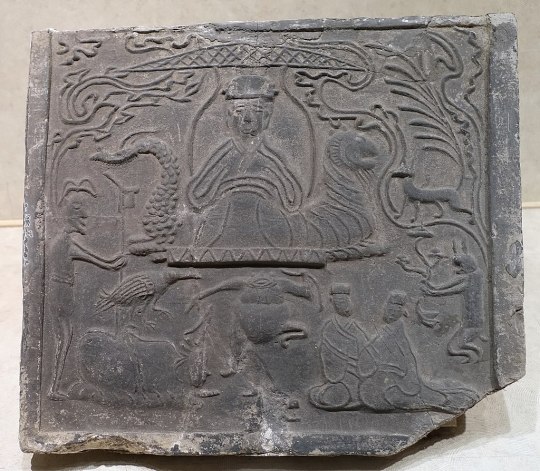
<China Han Dynasty stone-relief showing 西王母/Queen Mother of the West from Sichuan,China>
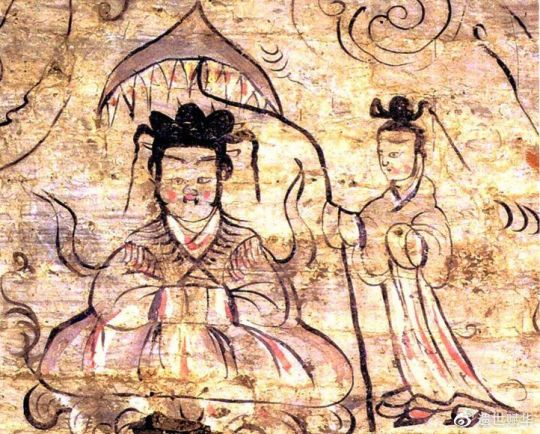
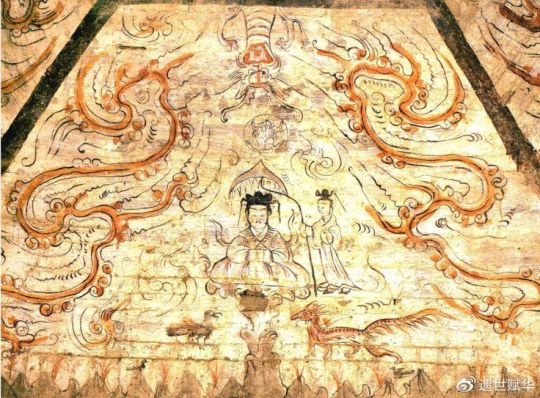
<China Wei and Jin Dynasties Mural showing 西王母/Queen Mother of the West>
————————
📸Photography post-production :@小何力
👗Hanfu & 👑Crown:@雁鸿Aimee
💄 Makeup:百丽 (临溪摄影)
👭Model:@清音音音音
🔗 Weibo:https://weibo.com/1648616372/O2R5bpBud
————————
#chinese hanfu#immortal hanfu#西王母/Queen Mother of the West#Chinese mythology#hanfu#hanfu accessories#hanfu_challenge#chinese traditional clothing#china#chinese#chinese history#china history#漢服#汉服#中華風#小何力#雁鸿Aimee#永乐宫/Yongle Palace
307 notes
·
View notes
Text
A list of closed practices
African & African Diasporic Traditions
Hoodoo / Rootwork
Voodoo (Vodou / Vodun / Voudou)
Santería (Lucumí)
Candomblé
Palo Mayombe
Ifá
Indigenous & Native Practices
Native American / First Nations Spirituality
Mexican Curanderismo (Certain Aspects)
Brujería (Certain Aspects)
Asian Spiritual Practices
Some Aspects of Taoist Magic
Certain Hindu Rituals & Tantra
50 notes
·
View notes
Text
Some thoughts on the two Medicine Sellers and Karakasa's themes
Based on what we know so far, the big theme of Karakasa seems to be the destruction of individuality for the sake of integrating with a group. This is what Nakamura-san said the movie would be about from the start, and we're seeing that play out already in the many trailers that have been released. The women of the Ōoku are initiated from their first day there in the water ritual, which requires them to sacrifice things they value to O-Mizu-sama. Thereafter, they're trained to serve the Ōoku, even to the point of denying their true feelings.
That this ultimately requires the sacrifice of their individuality we can see pretty clearly in the maids who are already "integrated"—they appear again and again with featureless faces, marked only by a spiral shape that's reminiscent of swirling water.

Freaky.
This loss of individuality isn't just treated as a virtue; it's treated as necessary and sacred.
This is a lot like the Buddhist concept of "no self." It's often taught that to attain enlightenment is to attain no-self, or the "true self" beyond the individual. In Taoist terms, this means reaching the origin of birth and death. The latest lore document discusses these concepts a bit.
This idea that "no self" is equivalent to enlightenment can lead Buddhist disciples to the idea that the ultimate goal of practice is to let go of all ego forever. Again from a Taoist perspective, that effectively means returning to the origin and staying there.
Like integration into the Ōoku, this is a kind of conglomeration. To die to the self and return to the origin is to lose individuality in an indescribable "void" that's considered to be the true nature of all things. But this void is also the origin of birth and death, and one isn't meant to remain there. Staying in the origin is death without birth; it's clinging to an unnatural separation of "oneness" and the individual. Obviously, this separation isn't really "oneness." Hence other Buddhist teachings that say clinging to the idea of no-self is the same as clinging to a self.
From this perspective, the O-Mizu worshipping practices of the Ōoku are in no way sacred. They're leading the women to spiritual death, which in the end may become physical death, or at the very least leave them hollow shells. Without a sense of self, there's no life.
Then there are the Medicine Sellers. They embody a higher state of awareness, or a state closer to enlightenment than that of the humans. From the perspective of true oneness, they may embody true enlightenment, the meeting of the divine and the individual. This isn't just because each of them is a fusion of god and human wherein they and the god retain their own personalities, but also because each of the Medicine Sellers is an individual themselves.

Grumpy and Happy.
While the humans try to achieve an ideal state by "virtuously" sacrificing their egos, the Medicine Sellers are already in some higher state without making any such sacrifice.
Their stories illustrate the value of their individuality in the service of humans. The first and second Medicine Sellers are opposites because they have opposite goals. Each group of humans they guide has gone to an extreme state of "separateness." The first Medicine Seller's humans show the reason for the "no self" teaching: They cling to identities that have become toxic, effectively prisoners of their own minds. This is a long-established behavior for us. We define ourselves based on what we're taught is right or safe, and then we stick to those self-definitions even when they hurt us.
So the first Medicine Seller is detached from humans. He doesn't get drawn into their identities. He's not driven to protect them; he's driven to destroy them. His, as Nakamura-san puts it, lack of interest in people even to the point of apparent cold-bloodedness doesn't mean he doesn't care about them. It means he knows that returning them to the "origin" is the only way to save them.
But the second Medicine Seller is dealing with an opposite, and arguably a more modern, problem. The humans in Karakasa are exclusively seeking "no self." The Ōoku's women have abandoned their individuality and demand that Asa and Kame do the same, ceasing to value themselves and each other.

These bitches gay.
So the second Medicine Seller is more "interested in people" and protective of them. His goal is to sustain individuality and help people stay in the world. It's not the identities he's dealing with that are toxic; it's the glorified conglomeration that threatens to swallow them up.
Obviously I haven't seen Karakasa, and I'm extrapolating all of this based on what we know. But from the perspective of what we do know, this makes sense. Karakasa is about individuality, and it's here that Nakamura-san decided to reveal to us that not only are there multiple Medicine Sellers, but they can have personalities so different as to be, at least in some ways, opposites. And he told us what they are: the I Ching's 64 hexagrams, elements vital to the functioning of the world. Their individuality is vital to the functioning of the world.
And if beings more "conscious" than us need their individuality to keep the world turning, then so do we. Throwing it away doesn't lead us to enlightenment. On the contrary, it moves us farther from the sacred.
80 notes
·
View notes
Text
[CN] Shaw's Dual Cultivation Pact Date - Part 1
⚡Warning: This post contains detailed spoilers for a Date which hasn’t been released in EN yet!⚡

[Released Date: 4 August 2024]
[Section 1]

Mayor: To be honest, we really shouldn’t bother you with such trivial matters… Mayor: If the fairy hadn't set up a large formation here to protect our town over the years, I'm afraid this area would have been trampled by demons…
The old man in front of me complimented me endlessly, but at the critical moment, he hesitated to speak and kept looking at my face.
Looking at his submissive look, I felt a little funny, so I lazily changed my sitting position and spoke directly.
MC: There's no need for small talk. The old gentleman wants to talk about Shaw, right?
Hearing the name "Shaw", the villagers shivered instinctively and gritted their teeth before nodding.
Mayor: That's right! That's him! That disciple of yours is acting too arrogantly!
The mayor immediately started talking and complained endlessly.
Basically, it all boils down to Shaw being rude when traveling the world, being selective when fighting demons, and not knowing how to hold back. It's all just boring stuff.
I blocked a yawn with my sleeve, but the mayor didn't notice my impatience. He took a sip of strong tea and patted his knee.
Mayor: …..This time, he went even further and actually tied butcher Qian to a tree, using him as bait to attract ghosts! MC: Oh. Mayor: Butcher Qian was so frightened that he was still lying in bed! MC: ….oh. Mayor: Their whole family depends on him for food. Life is really difficult these days, so… ?.?: So what?
A voice sounded above my head. I looked up and met a pair of playful eyes.
It's Shaw. He sat back on the beam, dangling his long legs, and smiled at me leisurely, then turned his eyes to the mayor.
The young man's tone clearly carried a smile, but his words were as sharp as a blade.

Shaw: I’m asking you, so what? Mayor: No, nothing!!
The mayor stood up in a hurry and almost knocked over the unfinished tea cup.
Mayor: ——Fairy MC, Taoist Master Shaw, I suddenly remembered that I have something to do at home, so I’ll take my leave first!
Before I had a chance to speak, Shaw had already leapt down from the beam and landed right in front of me, just as the mayor scrambled away in a hurry.
He first gave a cold sneer, then swept the teacup the man had used out the door with a flick of his sleeve, treating it like trash.

Shaw: What was he here for? MC: What do you say? MC: Of course, he's here to complain about you, my 'recalcitrant disciple,' being too disobedient and in need of correction.
Shaw: Hey, who is your disciple? Do you still want to train me?
I fiddled with the tassels on my whisk and curled my lips.
MC: Since you're not my disciple, why do you have the right to look at the cultivation manuals and texts I've collected?

Shaw: No reason. Anyway, I want to read it, and you can’t stop me, right? Shaw: Besides, I haven’t looked at your cultivation manuals for nothing. Shaw: Since I came here, haven't you been able to practice your cultivation with peace of mind, without having to be invited down the mountain by these people every once in a while?
Back then, Shaw appeared at my courtyard gate without any warning.
He claimed to be a wandering martial Taoist, here to find someone, and while he was at it, to do some ghost and demon exorcism work to make a bit of extra money.
Seeing that he had good aptitude, I casually gave him some pointers.
In return, while he was traveling down the mountain, he used my name and handled many mundane affairs on my behalf.
This subtle understanding has continued until now. But now…
MC: Other things might be forgivable, but why were you so harsh with the butcher Qian? Shaw: Didn't you tell me about Qian Butcher before? This fat man encountered a demon with his brother when he was young. He pushed his brother into the demon's mouth and ran away. Shaw: Afterwards, feeling guilty, he came to you for help with rituals and prayers, didn't he?
While he was talking leisurely, he poured a cup of tea and pushed it in front of me.
I took a sip of the tea and briefly recalled that I might have mentioned this during one of our casual chats over tea and meals.
MC: What does this have to do with you bleeding him to attract ghosts?

Shaw: It doesn't matter, I just want to say... I am much kinder than him. Shaw: He used a human life to feed the demons, while I only use a vial of blood and a bit of courage... With all the clamor, aren’t I still kind-hearted?
When Shaw leaned toward me, the faint scent of tea flowers escaped from his collar, and I held my breath.
MC: You might think it's just the way it is, but let me remind you of something… MC: Next time, do it more discreetly, lest the old man come up the mountain again and bore me to death.
Shaw burst out laughing.
He originally had sharp features and a somewhat arrogant appearance. When he smiled, his demeanor became even more unruly and bold. He didn't seem like a righteous person dedicated to expelling demons and upholding justice, but rather like a little devil causing trouble in the world.
When he stopped laughing, I asked him some more about his experiences at the foot of the mountain, and all I got were answers that were completely different from the mayor's.

Shaw: ...I scolded him because he deserved it. I told him not to go out during the time of demons, but he insisted on strolling around. All I can say is that if he died, he brought it on himself. Shaw: ...Is a poor person's life worth less? Anyway, I’ll go help where I want to help. If he's in a hurry, he can ask another Taoist priest. Shaw [sighs]: …That demon was quite powerful. I was caught off guard, which is why it managed to set half the village on fire. If I had known earlier, I would have learned from her. MC [surprised]: Her?
When I heard this word, my heart felt like it was gently pulled by a thread, but my face was still smiling.
MC: Are you referring to Fairy Xuanhe when you say "her"?

Shaw: Yes, who else could it be?
I looked at Shaw, and he confidently spread his hands.
Shaw: If she were to handle it, she would probably crush the monster to ashes, and avoid the troubles that would follow. MC: Not necessarily. MC: Fairy Xuanhe has an eccentric personality and cruel methods, which will only cause more trouble. MC: Maybe if she wasn’t in a good mood while exorcizing demons, she might set the village on fire herself. Shaw: …..
Shaw narrowed his eyes and twitched the corner of his mouth.

Shaw: MC, I originally thought you were different from the rest of the world. Shaw: It turns out you think of her the same way. MC: It’s not that I think of her that way, it’s that everyone in the world thinks so. Shaw: Everyone in the world? Shaw [scoffs]: I don’t care what everyone in the world does, I just ask you, do you also think that Fairy Xuanhe is a fallen witch?
I averted my gaze, avoiding the sight of Shaw's hand slowly curling into a fist, and spoke each word deliberately.
MC: Does what I think matter? MC: Shaw, she is dead. Don't look for her anymore. It will only make you have delusional thoughts… Shaw: I do not believe.
Shaw interrupted me coldly.
Shaw: Unless I see her body with my own eyes, I won't believe it.
He had reached this point, and I knew that it would be useless to say more, so I could only close my mouth.
A long silence brewed between me and him. When the teacup on the table was no longer warm, Shaw finally stood up.
He picked up a few books on my table and waved at me.

Shaw: It's time for me to leave. Please lend me these few volumes of exercises and return them to you later. Shaw: By the way, remember to treat me with a different kind of tea next time, this one is too unpleasant to drink. MC: Whoever wants to entertain you, please return the book to me!
I shouted angrily at Shaw's back, only to receive a wanton chuckle from him.
—
[Section 2]

Ever since the earth's spiritual veins were tainted by demonic energy a century ago, monsters have been rampant everywhere. Not only have people been living in constant unease, but even the flowers and plants have lost their vibrancy, always appearing withered and desolate.
Sighing, I broke off a few withered branches and finally discovered a cluster of blooming flowers.
MC: ...Although they bloomed a bit later than last year, it's good that we met again.
I reached out my hand with joy and touched the petals.
It gently swayed its branches, as if responding to my mood. A drop of night dew fell from its petal tip, moistening my fingertips.
I brushed away the water stain, and my thoughts drifted away, following the spreading fingerprints.
Shaw [in a low voice]: What are you doing?
A slender hand suddenly appeared before my eyes, emanating a familiar, stronger fragrance of blooming tea from the sleeve.
Only then did I come back to my senses and turn around to glare at Shaw.
MC: Why do you scare me every time you come here?

Shaw: Are you scared? I see that your expression is very calm every time. MC: Hmph, it's just my refined demeanor. Shaw: Yes, yes, who doesn’t know that Fairy MC is unparalleled and her joy and anger are never visible in her expressions.
Shaw casually quarreled with me, raised his eyebrows, and looked around.

Shaw: How do I feel... your yard is much prettier than the last time I came here? MC: You always come in autumn and winter, so how can you see any flowers and plants? It's almost summer now, and of course the flowers are blooming more. Shaw: Indeed, you must have put a lot of thought into raising these delicate little things so well, right? MC: Fortunately, it doesn’t matter if you spend more time thinking on the things you like. Shaw: As long as you like it, will you spend more time and effort?
Shaw's rhetorical question came out of nowhere. I was a little surprised and turned to look at him. But I saw his eyes falling directly on my face as if he was confirming something.
Being stared at by him made me feel a little nervous, and I bit my lip.
MC: What's wrong...don't you know how? Shaw: Of course, I do too.
Shaw finally looked away and raised the corners of his mouth.

Shaw: I will not put just "a little" thought into something I like, but will use all my strength and risk everything to win it.
Indeed, you're still too young. Only someone youthful would casually use words like 'exhaust' and 'everything,' which carry such a resolute meaning. I couldn’t help but chuckle.
MC: You'd better keep some for yourself. You've finally achieved results in your cultivation. Wouldn't it be a big loss if you gambled it all away? Shaw: Lose or win, I have the final say.
After he finished speaking, he paused and added another sentence.
Shaw: MC...has my practice really paid off? MC: Certainly. Even if you don’t know how many boundaries you have broken, you can still feel the yang energy in your body being filled, right? Shaw: That's true... Lately, when I've been walking at night, no wandering spirits or ghosts dare to come near me.
Shaw muttered, handing me a few scrolls from his arms.

Shaw: I'm really curious, where exactly did you get these techniques from? Shaw: I've been stuck at a bottleneck in my cultivation for a long time. I've sought help from both reputable sects and unorthodox paths, but nothing has worked—I've been stuck at the same level. Shaw: Ever since I started using your techniques, cultivation has become remarkably easy. MC: These are all techniques I created myself. Besides, isn't it a good thing that they're simple to practice?
I took the scrolls and calmly met his gaze.
MC: Just think that this fairy is an unparalleled genius and happened to be so compassionate that she helped you.

Shaw: Hahaha, this is the first time I have seen someone say that she is a genius!
He laughed so loudly that I couldn't help but pout.
MC: Is that not okay? Shaw: Of course, this genius fairy is so cute.
His straightforward words made my face heat up slightly, and I quickly changed the topic.
MC: Okay, tell me what you have experienced during this time.
In order to ensure the stability of the formation and peace in all directions, I have been living in the mountains for a long time. I rely on Shaw to tell me everything I know about the outside world.
Who did you meet, what demon did you kill, what food and wine did you eat…
From Shaw's gentle words, I could hear, see, and feel the long-lost warmth of the everyday world.
But this time as I listened, I suddenly noticed something was wrong.
MC: ..... Even if this monster makes you unhappy, you can just get rid of it. Is it necessary to beat it half to death and throw it in front of its deadly enemy?

Shaw [scoffs]: Oh, it offended me, why should I let it die happily? Shaw: Of course, I have to let it be tortured to death by its mortal enemy so that I can feel relieved. MC: ……Nonsense.
Is he imitating Fairy Xuanhe's method again? Looking at Shaw's face, I swallowed these words and sighed lightly.
MC: When I first met you, you were still a very well-behaved child.

Shaw [clicks his tongue]: Tsk, who are you calling a kid? Do you really think you're that much older? Shaw: Besides, when I saw you, I looked pretty much the same as I do now. Where exactly do you think I still seem like a kid?
Shaw took a step forward. With his tall stature and sharp demeanor, his presence was imposing and gave off the pressure of an adult man, making it difficult to resist.
I couldn't help but take a step back. Seeing me retreat, Shaw seemed to find it amusing and continued to advance, matching my steps.
The more I retreated, the further he advanced, until I had nowhere left to back up. My back pressed against the flower stand, and I found myself surrounded by the intense fragrance of blooming flowers.
I couldn't help but stare at him, but he just smiled at me.
MC: Is it fun?

Shaw [whispers seductively]: Fun. Shaw: Seeing the clumsy fairy retreating like this, not even bothering to use a spell to push me away, is really amusing... Eh!
I immediately did as he wished, swinging my whisk and sending a gust of energy that forcefully pushed him backward.
Shaw stumbled a few steps before steadying himself with the flower pot, but the corner of his mouth was still turned up in a smile.
Shaw: You pushed me too far. MC: You should just stand there. Shaw: I prefer not.
As he spoke, Shaw plucked a blue lotus from the flower pot and approached me again.
He raised his hand and placed the blue lotus hairpin into my hair.
MC: …..?
I looked at him, puzzled, and met his gaze with his crescent-shaped eyebrows and eyes.

Shaw [in a sweet voice]: This is just a token of gratitude for lending me your techniques. MC: Shaw, you borrowed my books and now you’re giving me one of my own flowers as a return gift? You're the one being foolish!
Shaw [whispers seductively x1]: Maybe. Shaw [x2]: But the fairy looks quite beautiful like this.
His whisper was low and seductive, but also with a subtle hint of caution.
In those bright eyes, there was only my reflection: the snowy white robe and the delicate blue lotus.
The fragrance of the blooming flowers grew more intense, like a fine wine nearing its perfect brew.
My heart raced as if something long-awaited was about to appear before me.
MC: Shaw….

Shaw [x3]: I remember she looked like this when I first saw her.
Everything was shattered, and my face instantly turned cold.
I swung the whisk again, and this time, Shaw was sent outside the courtyard, a hundred meters away, before he even had a chance to make a sound.
MC [coldly]: I won't accept it.
—
📿 Part 2
#LMAO this troublemaker loves to cause chaos everywhere 😂#Shaw 99% causing trouble - while the remaining 1% is for pursuing MC 🤪#our poor MC listening to endless complaints of her troublemaker disciple 🤣#mlqc spoilers#mlqc cn#mlqc shaw#mlqc ling xiao#mr love queen's choice#mlqc translations#mlqc#love and producer
54 notes
·
View notes
Text
Knotting the Banner by David J. Mozina
Academic research unfolding within a living biographical narrative.
This impressive book combines the virtues of ethno-cultural and religious study and adventure novel. In the context of everyday Hunan, the reader discovers a world permeated with cosmogonic meanings: it’s like a Rabbit Hole into Taoist thinking. A complicated mystic quest takes place right in the rural daily routine.
David J. Mozina explores the topic of Banner Rites focused on worship of the Lord Yin Jiao (殷郊 aka 殷交), the principal of the sixty Tai Sui (太歲). The fierce celestial Tai Sui is a much revered guardian deity in Taoist exorcism.
An essential book for the connoisseurs of authentic experiences.
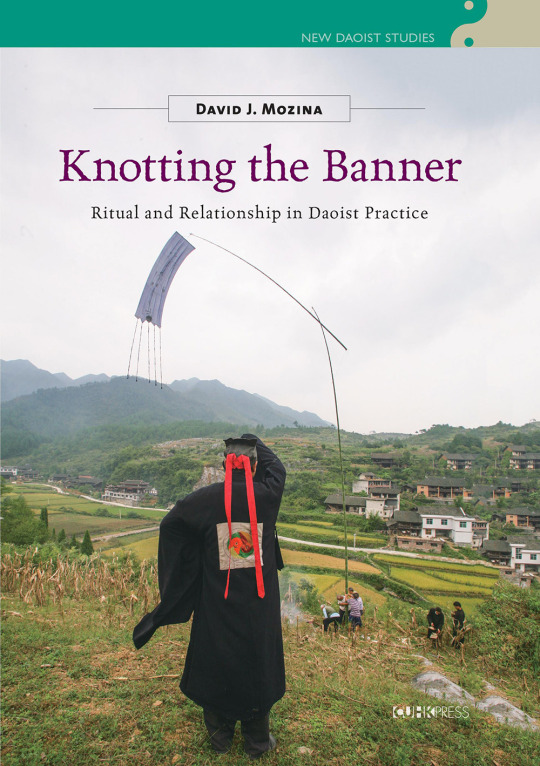
Mozina, D. J. (2021). Knotting the Banner: Ritual and Relationship in Daoist Practice. University of Hawaii Press.
#book boost#book recommendations#book#taoism#taoist sorcery#taoist deities#chinese culture#chinese mythology#taoist magic#taoist#chinese traditions#reading#ancient china#daoism#taoist ritual#taoist immortal#daoist#inner alchemy#neijia#taoist spell#fu talisman#thunder rites#雷法
47 notes
·
View notes
Text
Where It All Began: The Ancient Roots of Witchcraft

Witchcraft didn’t appear out of nowhere like a mysterious cloaked figure under a full moon. Its roots stretch deep into the soil of human history, sprouting from the primal desire to understand, interact with, and occasionally charm the forces of the natural world. In essence, witchcraft was humanity's first attempt to make sense of life’s mysteries—birth, death, illness, and those pesky harvests that sometimes failed to cooperate.
Mesopotamia: Magic at the Dawn of Civilization
In the ancient lands of Mesopotamia, magic was woven into everyday life like the intricate patterns of a Sumerian tapestry. Priests and priestesses doubled as magicians, using rituals to appease gods or ward off mischief-making demons. The Assyrians and Babylonians developed complex systems of divination, like hepatoscopy (reading the entrails of sacrificed animals) and astrology, where the movements of celestial bodies were believed to influence earthly events. Think of these practices as ancient spreadsheets for managing cosmic chaos.
One standout Mesopotamian magical figure was the āšipu, or exorcist. Armed with incantations and symbolic objects, they combatted evil spirits with the confidence of someone holding a holy water squirt gun. Their spells were recorded on clay tablets, many of which have survived, offering us a peek into their magical toolkit.
Ancient Egypt: Spells, Deities, and Afterlife Insurance
Move over Cleopatra—Egyptian magic deserves its own red-carpet moment. For the Egyptians, magic (heka) wasn’t just a tool but a divine force that existed before creation itself. Gods like Thoth and Isis were thought to wield heka with unparalleled mastery, inspiring humans to follow suit.
The Egyptians had spells for almost everything: curing snake bites, securing a prosperous journey in the afterlife, or even ensuring a good hair day (yes, beauty magic existed). Amulets were their magical multitaskers, offering protection, health, and a little pizzazz. The famous Book of the Dead was essentially a magical user manual for navigating the perils of the afterlife. If reincarnation were an obstacle course, the Egyptians were determined to ace it with cheat codes.
Greece and Rome: The Birth of Western Esotericism
The ancient Greeks and Romans didn’t just dabble in magic—they wrote dissertations on it. In Greece, philosophers like Pythagoras and Plato explored metaphysical concepts that later influenced magical thought. Pythagoras, for example, wasn’t just a math guy; he believed numbers had mystical properties. So next time you curse algebra, remember it might have been a magical tool at some point.
The Greeks also gave us some of the earliest grimoires, such as the Greek Magical Papyri. These texts were chock-full of spells, invocations, and recipes for crafting magical potions. They even included tips for summoning deities or spirits, proving that ancient people also loved a good life hack.
Meanwhile, the Romans took a more practical approach to magic, using it for love, revenge, and keeping those pesky neighbors in check. Curse tablets, thin sheets of lead inscribed with hexes, were buried at sacred sites to call upon the gods for justice. It’s basically the ancient equivalent of subtweeting someone, but with higher stakes.
The Far East: Mysticism and Balance
Across the globe, ancient Chinese and Indian traditions were also steeped in magic and mysticism. In China, Taoist practices incorporated rituals, talismans, and alchemical experiments to achieve harmony with the Tao, or the natural order of the universe. The blending of spirituality and practicality was key, with many rituals aimed at promoting health, longevity, and prosperity.
In India, the Vedic texts described rituals and hymns to invoke divine powers. These practices evolved into a blend of spirituality and mysticism that still influences Hinduism and other traditions today. The emphasis on balance and connection to universal energy feels remarkably modern, doesn’t it?
Shamanism: The Universal Foundation of Magic
Before the rise of organized religions, shamanic traditions thrived across cultures from Siberia to South America. Shamans acted as intermediaries between the physical and spiritual realms, often entering trances to seek guidance or heal their communities. Whether they were chanting, drumming, or consuming psychedelic plants, shamans were the original multi-class characters—part healer, part mystic, part community leader.
The tools of their trade—herbs, bones, and natural objects—laid the foundation for many magical traditions that followed. The use of sympathetic magic (the idea that like affects like, such as using a doll to represent a person) can be traced back to these early practices.
Magic Across Africa and the Americas
In Africa, magic and spirituality were deeply intertwined with everyday life. Practices like Ifa divination in Yoruba culture involved intricate systems of symbols and interpretations, revealing paths to healing, growth, and understanding. Meanwhile, in Mesoamerica, civilizations like the Maya and Aztecs used rituals and offerings to communicate with their gods, often centering around natural cycles like the harvest or the movements of the sun and stars.
The connection to nature in these practices wasn’t just poetic—it was practical. By aligning their magic with the rhythms of the earth, ancient people ensured their survival and fostered a sense of harmony with the world around them.
The Bigger Picture
From the rivers of Mesopotamia to the temples of Egypt and beyond, early witchcraft and magical practices were about survival, connection, and understanding the mysteries of existence. These ancient roots remind us that magic isn’t just about casting spells—it’s about fostering relationships with the forces that shape our world, whether they’re gods, spirits, or the natural elements.
Now, when you light a candle, hold a crystal, or write in your journal, remember: you’re participating in a tradition as old as time. How’s that for a little magic in your day?
#witchblr#witches#witchcraft 101#witchcraft blog#witchcraft info#healing energy#witchythings#witchcraft#witch community#learning magick
24 notes
·
View notes
Text
Japanese Magick
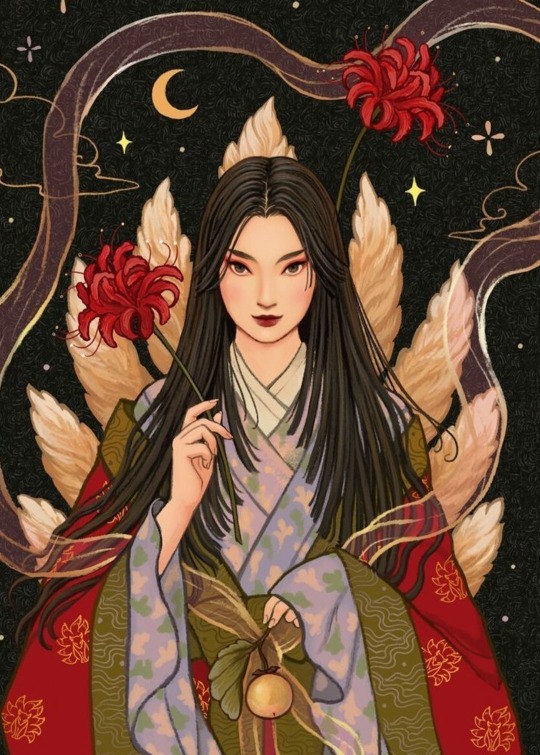
Japanese spirituality and folk magick are deeply rooted in Shinto, Buddhism, and indigenous traditions that blend animism, kami (spirits), and ritual practices. While Japan does not have a historical "witchcraft" tradition in the Western sense, it has a rich magickal heritage that includes onmyodo (esoteric cosmology), shugendo (mountain asceticism), folk magick, and spiritual practices passed down through generations.
So, let's explore the key elements of Japanese witchcraft and magick, including history, deities and spirits, traditional magickal practices, and how modern practitioners integrate these elements into their craft.
Foundations of Japanese Magick
🏮Shinto (神道) – The Way of the Kami
Shinto is the indigenous spiritual tradition of Japan, centered on reverence for kami (divine spirits) found in nature, ancestors, and sacred places. Many Japanese magickal practices stem from Shinto beliefs and rituals.
Key Concepts in Shinto Magick:
• Kami (神) – Spirits or deities that inhabit all things, including trees, mountains, rivers, and animals.
• Purification (禊 Misogi & 祓 Harai) – Cleansing oneself or a space of impurities before engaging in spiritual work.
• Offerings (供え物) – Giving food, incense, or prayers to kami and spirits to seek blessings or protection.
• Omamori (お守り) – Charms that provide luck, protection, and blessings.
🏮Onmyodo (陰陽道) – The Way of Yin-Yang
Onmyodo is an ancient system of esoteric cosmology and divination based on Taoist principles of yin-yang and the five elements. Practitioners, known as onmyōji (陰陽師), were skilled in astrology, geomancy, exorcism, and protective magick.
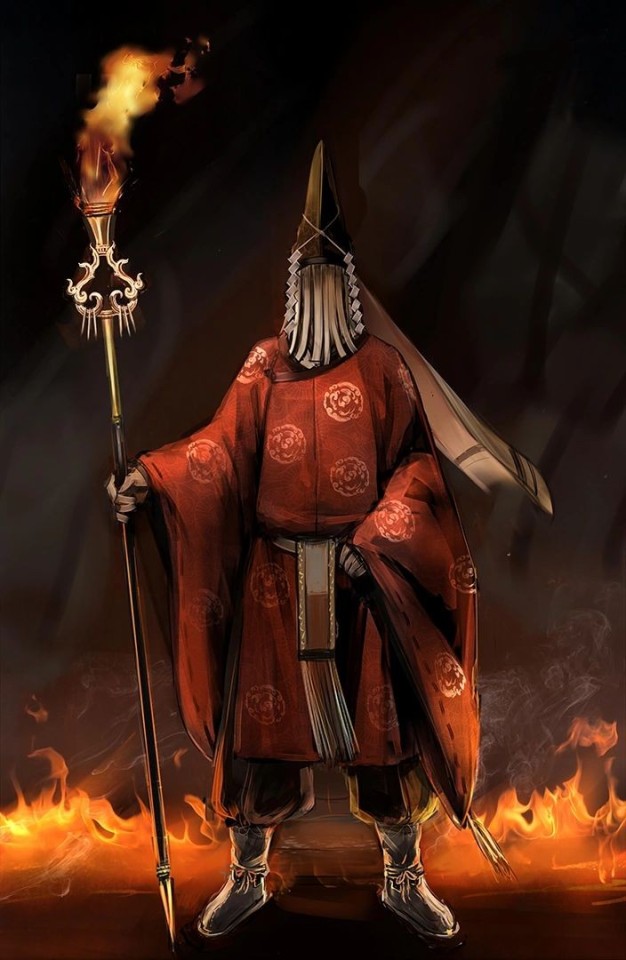
Onmyodo Magick Includes:
• Divination (卜占) – Fortune-telling using astrology, geomancy, or sacred texts.
• Talismans (護符 Gofu / Ofuda) – Paper or wooden charms inscribed with sacred symbols or prayers for protection.
• Spirit Banishing (鬼払い Oni-barai) – Rituals to remove negative spirits and influences.
• Elemental Magic (五行 Gogyō) – The Five Elements (Wood, Fire, Earth, Metal, Water) used for balance and spellwork.
🏮Shugendo (修験道) – Mountain Asceticism
Shugendo is a mystical tradition that blends Shinto, Buddhism, and Taoism. Its practitioners, known as yamabushi (山伏), are mountain monks who engage in spiritual endurance training, chanting, and nature-based magick.
Shugendo Magical Practices:
• Nature-Based Rituals – Using waterfalls, mountains, and caves for spiritual cleansing and empowerment.
• Firewalking (火渡り Hi-watari) – Walking over fire as a purification ritual.
• Mantra Chanting (真言 Shingon) – Reciting sacred phrases to invoke deities and spirits.
Key Deities and Spirits in Japanese Witchcraft
🏮Major Kami Associated with Magick:
• Inari Okami (稲荷大神) – Kami of prosperity, agriculture, and fox spirits (kitsune). Often invoked for abundance and transformation magick.
• Tsukuyomi (���読命) – Moon deity, associated with night magick, divination, and intuition.
• Ame-no-Uzume (天宇受売命) – Goddess of dawn, joy, and ritual dance. Invoked for creativity and uplifting energy.
• Raijin & Fujin (雷神・風神) – Thunder and wind gods, called upon for storm magick and elemental work.
• Susanoo-no-Mikoto (須佐之男命) – Kami of storms, exorcism, and warrior energy.
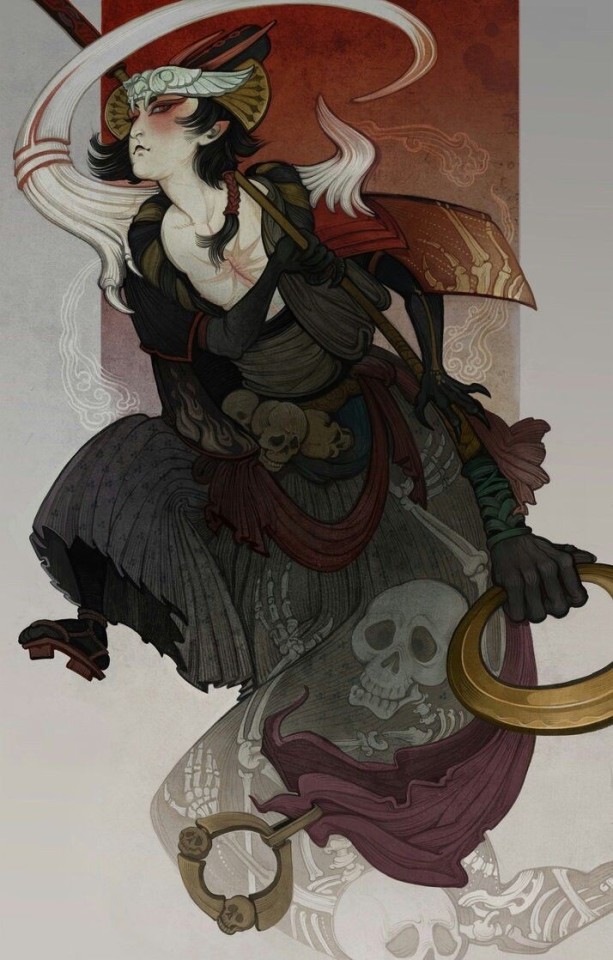
🏮Yokai (妖怪) & Spirit Beings:
Japanese folklore is filled with supernatural creatures, some of which play a role in magick:
• Kitsune (狐) – Fox spirits associated with transformation, illusion, and trickery.
• Tengu (天狗) – Mountain spirits and warriors with powerful knowledge of magick and martial arts.
• Yurei (幽霊) – Ghosts and ancestral spirits that may require appeasement or exorcism.
Traditional Japanese Magickal Practices
🏮Divination & Fortune-Telling:
• Omikuji (おみくじ) – Paper fortunes drawn at shrines to reveal one's luck.
• I Ching (易経 Ekikyō) – Taoist divination practice adopted in Japan.
• Tenmon (天文) – Japanese astrology, used by onmyōji for predicting fate and auspicious times.
🏮Talisman & Charm Magick:
• Omamori (お守り) – Protective charms bought from shrines, charged with blessings from kami.
• Ofuda (御札) – Paper talismans often hung in homes for protection.
• Shide (紙垂) – Zigzag-shaped paper strips used in purification and shrine rituals.
🏮Protection & Banishing Spells
• Salt Purification (塩清め Shio-kiyome) – Sprinkling salt around spaces to remove negativity.
• Oni-barai (鬼払い) – Banishing rituals to drive away malevolent spirits.
• Suzu (鈴) – Small bells used to ward off bad spirits.
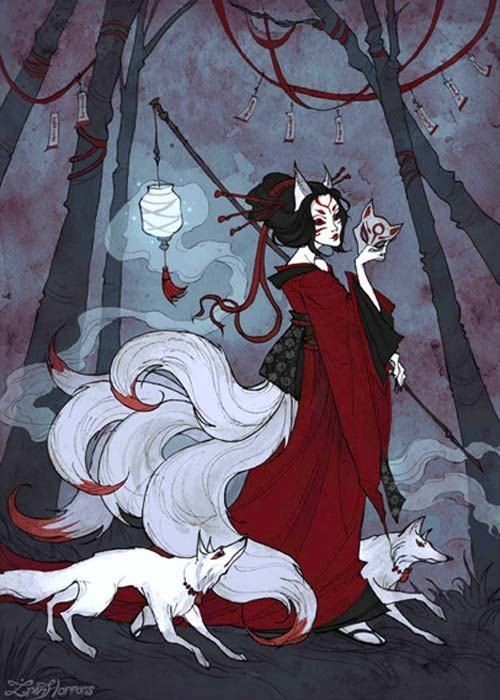
🏮Elemental & Nature Magick
• Waterfall Purification (滝行 Takigyo) – Ritual bathing in waterfalls to cleanse the spirit.
• Moon Rituals (月の魔法 Tsuki no Maho) – Working with lunar phases for manifestation and divination.
• Kitsune Magick – Calling upon fox spirits for wisdom, transformation, and trickster energy.
Modern Japanese Witchcraft & Contemporary Practices
While Japan does not have a strong tradition of "witchcraft" as seen in the West, modern witches and spiritual practitioners integrate traditional elements into their craft.
🏮Ways to Practice Japanese-Inspired Magick Today:
• Shrine Visits – Offering prayers and petitions to kami.
• Japanese Herbal Magick – Using plants like mugwort (ヨモギ yomogi) for protection and cleansing.
• Tea Rituals – Preparing and blessing tea with intentions for peace, health, and wisdom.
• Shinto-Inspired Spellwork – Creating small home altars (kamidana) for divine guidance.
• Combining Onmyodo with Western Practices – Blending astrology, talisman magic, and elemental balancing with modern witchcraft.
Japanese magick is deeply connected to nature, spirits, and ancestral traditions. While Japan does not have a direct equivalent to Western witchcraft, its spiritual and folk practices offer rich ways to work with energy, divination, and protection magick. Whether you are drawn to Shinto nature worship, onmyodo divination, or spirit work with yokai, Japanese magickal traditions provide a fascinating and profound path for spiritual exploration.
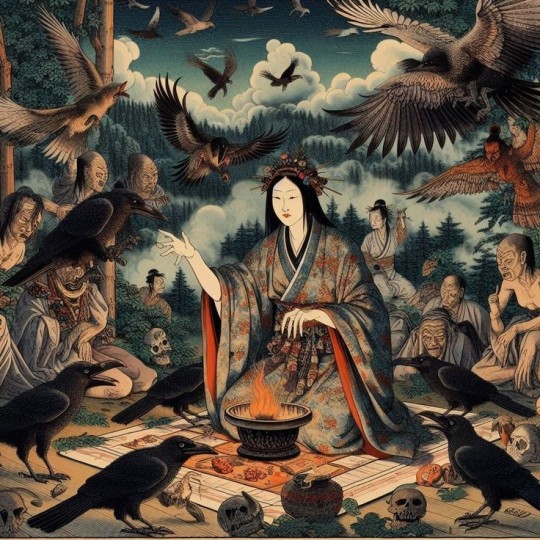
#japan#japanese#japanese mythology#shinto#Kami#onmyodo#kitsune#Oni#tsukuyomi#witch#magick#witchcraft#demons#witchblr#witch community#eclectic witch#eclectic#pagan#spellwork#divination#protection magic#talisman#charms#spirit#nature spirits#exorcism#protection#i ching#culture#Religion
16 notes
·
View notes
Photo
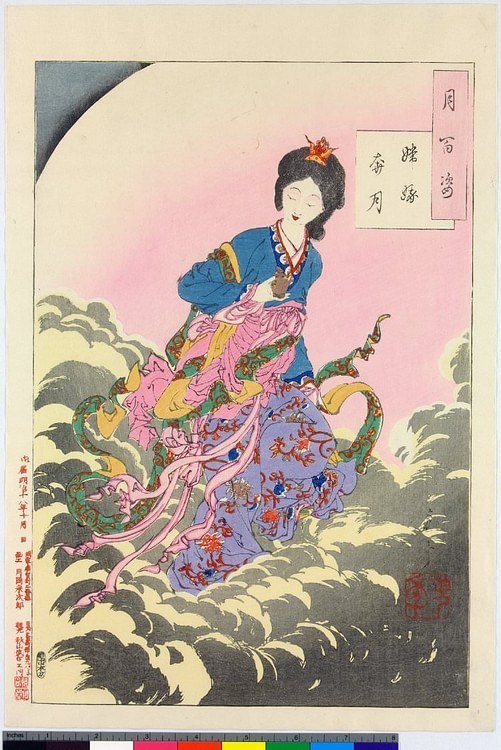
Most Popular Gods & Goddesses of Ancient China
There were over 200 gods and goddesses worshipped throughout ancient China, but if one were to count every deity or spirit, the number would be over 1,000. Each town, village, city, field, farm, and sometimes even separate plot in a graveyard, had its own Tudi Gong, an elemental earth spirit, who was recognized and honored.
There were also spirits known as Kuei-Shen, nature spirits, who might inhabit a tree or live by a stream or preside over a garden. These were eternal spirits who had never been mortal but others, known as guei (or kuei, gui, kui), had once been human beings who had died and passed on to the afterlife. The guei could return to haunt the living for various reasons, and rituals, spells, and religious practices developed to appease them.
There were also deities who had once been mortal and now lived with the gods, such as the Baxian (Pa Hsien), the Eight Immortals of holy Taoists who were rewarded by the goddess Queen Mother of the West with immortality. The Baxian were prayed to like any of the other gods, as were one's ancestors who had passed over the bridge between the land of the living and the realm of the dead to live among the gods and watch over the living.
The gods were believed to have created the world and human beings, and they kept the world and surrounding universe functioning. Each deity had his or her own special area of power and influence, and the most important were given their own shrines and temples, although shrines were also erected to local spirits and to noble men and women who became deified after death.
These deities lived in palaces and castles high above human beings in places like the Kunlun Mountains, Mount Tai, the Jade Mountain, and Mount Penglai which was the mystical island of the afterlife somewhere far out at sea. Even though they were far away, they were still connected to human life on a daily basis, watching over and keeping account of the good and bad deeds people did. Each of the deities had their own part to play in the lives of people and the operation of the world from the most intimate moments to events of national importance such as a dynasty's collapse.
All of the gods, goddesses, and spirits were important to the people of ancient China, and remain so today, and selecting a certain small group leaves out many, many others who remain just as significant. However, one can single out those deities who had national prominence, are among the oldest, or are without question the most popular as shown through ancient writings and evidence from archaeological excavations.
The gods and goddesses listed below are given in the order they appear in Chinese writings. Most likely, deities like Nuwa, Fuxi, and P'an Ku were recognized much earlier than written records indicate, and the same is probably true of most of the gods and goddesses on the list. These deities are selected because they were all very important to the people of ancient China even though some were more prominent at certain times in history than at others.
Dragon
The dragon is the oldest symbol of a deity found in China. The dragon symbol appears on pottery found at the Neolithic site of Banpo Village dating from between c. 4500-3750 BCE. Dragon was considered a composite of yin and yang energies and was originally seen as a balancing force who was wise and just. The dragon Yinglong was known as The Dragon King and god of rain and waters. As god of the sea, he was known as Hong Shen and was prayed to regularly by sailors and fishermen, but farmers who needed rain for their crops worshipped Dragon as well. He is also shown in human form as a wise man with the full sun behind his head watching over a boat full of people.
Continue reading...
39 notes
·
View notes
Text

Our Beloved Kwan Yin
The Great Compassion Bodhisattva
(Avalokitesvara Bodhisattva)
Long ago, according to legend, Kuan Yin earned the right to enter Nirvana after her death. But when she stood before the gates of paradise, she heard the anguished voices of those left on earth and, turning away from bliss, vowed to remain in the world, gently leading others until all living things reached enlightenment. Kuan Yin, a bodhisattva, became the goddess of compassion, or 'she who hears the cries of the world,' and her message spread beyond the Chinese Buddhist community. Today she is known by many names in many countries. Because of her popularity, she is depicted in hundreds of ways. Most often shown as a slim and graceful barefoot woman dressed in flowing white robes, she is the embodiment of empathy, unconditional love, and perfect compassion. Sometimes she transforms herself - into a child, a man, or even a king - to better guide and teach the path to Nirvana.
Kuan Yin's goal is to liberate all beings from suffering, no matter who or what they are, and thus building a relationship with her involves little. There is no required ritual or dogma. Rather, her devotees strive to emulate her compassion and caring in their own lives by attempting to adhere to the standards of the goddess and by serving others. Kuan Yin's unselfish devotion to all living beings is key. She is free from pride and vengefulness, and passes no judgment. She is reluctant grants great comfort to the lost, the sick, the senile, the troubled, and the unfortunate. In the tales surrounding Kuan Yin, the dejected need only cry out to her for help to be freed from fear and danger.
Embracing the way of Kuan Yin is as easy as cultivating her virtues, which are said to exist deep within all beings, in your own life. You may want to meditate on her sacrifice and ask yourself what selfless actions you could take to better the world. She provides us with an example of how to better relate to the world and each other, asking us simply to treat all living things as we ourselves would be treated.
Kuan Yin is also spelled Guan Yin, is the bodhisattva of compassion venerated by East Asian Buddhists. Commonly known as the Goddess of Mercy, Kuan Yin is also revered by Chinese Taoists as an Immortal. The name Kuan Yin is short for Kuan Shih Yin (Guan Shi Yin) which means "Observing the Sounds of the World".
In Japanese, Kuan Yin is called Kannon or more formally Kanzeon; the spelling Kwannon, resulting from an obsolete system of Romanization, is sometimes seen. In Korean, she is called Kwan-um or Kwan-se-um. In Vietnamese, she is called Quan Âm or Quan Thế Âm Bồ Tát.
Praise To Kuan Yin Bodhisattva
Kuan Yin Bodhisattva's compassion for all beings is so vast and inconceivable, our gratitude cannot comprehend nor fully express the magnitude of her blessings. Her body and garments of brilliant, translucent White Light. Her adornments, a white vase of Compassionate Water in her left hand, The Sacred Willow Branch in her right hand.
Enlightened through infinite acts of compassion countless lifetimes ago. Her feet rest upon a fragrant red lotus flower above a vast ocean. Her brows curved and radiant like the crescent of an autumn moon. With the sweet dew drops she sprinkles from her vase, She relieves the suffering of beings everywhere and always, for countless autumns.
Prayers for help arise from thousands of hearts, and thousands of prayers are answered by her vow of eternal compassion: Beings in Samsara, who sail the ocean of suffering, She will guide and deliver safely to the ultimate shore of enlightenment.
Avalokitesvara (known as Chenrezig in Tibetan) is an important deity in Tibetan Buddhism. In particular, the Dalai Lama is held to be a manifestation of Avalokitesvara.
Other manifestations popular in Tibet include Sahasra-bhuja (a form with a thousand arms) and Ekādaśamukha (a form with eleven faces).
In Tibetan Buddhism, White Tara acts as the consort and energizer of Avalokitesvara. According to popular belief, Tara came into existence from a tear of Avalokitesvara. When the tear fell to the ground, it created a lake, and a lotus opening in the lake revealed Tara. Another version of this tale tells that Tara emerged from the heart of Avalokitesvara. In both, it is Avalokitesvara's outpouring of compassion which manifests Tara as a being.
Tibetan Buddhism relates Avalokitesvara to the six-syllable mantra Om Mani Padme Hum, also spelled Om Mani Peme Hung and Om Mani Padme Hon. It is for this reason that Avalokitesvara is also called Shadakshari, Lord of the Six Syllables.
In the Tibetan tradition, Avalokiteshvara is seen as arising from two sources. One is the relative source, where in a previous kalpa (era), a devoted, compassionate Buddhist monk became a Bodhisattva, thus giving the present kalpa its form of Avalokitesvara. That is not in conflict, however, with the ultimate source view, which is Avalokiteshvara as the universal manifestation of compassion. In brief, it may be said that the Bodhisattva is the anthropomorphised vehicle for the actual deity, serving to bring about a better understanding of Avalokitesvara to humankind.
***
23 notes
·
View notes